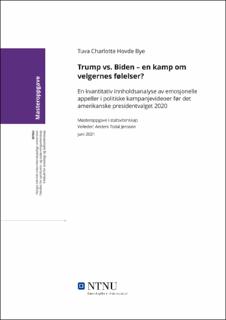| dc.contributor.advisor | Jenssen, Anders Todal | |
| dc.contributor.author | Bye, Tuva Charlotte Hovde | |
| dc.date.accessioned | 2021-09-28T17:35:30Z | |
| dc.date.available | 2021-09-28T17:35:30Z | |
| dc.date.issued | 2021 | |
| dc.identifier | no.ntnu:inspera:80180343:14967315 | |
| dc.identifier.uri | https://hdl.handle.net/11250/2784608 | |
| dc.description.abstract | Denne studien ser på hvorvidt emosjoner blir brukt som redskap i valgkommunikasjon i
politiske kampanjevideoer før det amerikanske presidentvalget 2020. Det empiriske grunnlaget
er avgrenset til et utvalg av 120 politiske kampanjevideoer. Utvalget er likt fordelt mellom
videoer som er produsert av Biden-kampanjen og Trump-kampanjen. Basert på
affektvekkingsteorien og tidligere forskning, var det en forventning om at partienes appell ville
være mer rettet inn mot følelser enn mot fornuft. Funnene fra analysen viser at partiene og
deres reklamebyråer foretrekker en affektladet valgkommunikasjon i sine politiske
kampanjevideoer. Politiske saker og saksstandpunkter nevnes, men de blir overskygget av en
affektiv appell. En sentral antakelse var at partiene ville benytte ulike (affektive)
valgkommunikasjonsstrategier, basert på om de lå under eller over på meningsmålingene.
Biden-kampanjen, som hadde flertallet i ryggen, prioriterte som forventet en «top-dog»-
strategi, og forsøkte å skape entusiasme rundt eget parti og kandidat i videoene. Som forventet
prioriterte Trump-kampanjen derimot en «underdog»-strategi, og førte en angrepsorientert
retorikk med mål om å ødelegge entusiasmen som seerne knyttet til Biden. Med utgangspunkt i
en sammenkobling av momenter i sakseierskapsteorien og affektvekkingsteorien var det en
forventning om at kampanjene ville forsøke å knytte positive følelser til partienes eide saker og
saksstandpunkter. Resultatene indikerer at en følelsesmessig appell er en sentral del av
sakseierskapet. Denne studien viser at partiene gjerne posisjonerer seg i forhold til hverandre
på andre måter enn selve saken. Gjennom å vekke bestemte følelser hos seerne forsøker
kampanjene i sine politiske kampanjevideoer å mer effektivt formidle sitt politiske budskap. | |
| dc.description.abstract | This master thesis is a study of whether emotions are used as a tool in election communication
in political campaign videos before the 2020 US presidential election. Based on the affective
intelligence theory and previous research, there was an expectation that the parties' appeal
would be more directed towards emotion than reason. The empirical material is limited to a
selection of 120 political campaign videos. The selection is equally divided between videos
produced by the Biden campaign and the Trump campaign. The findings from the analysis show
that the parties and their advertising agencies prefer to appeal to the viewers emotions in their
political campaign videos. Political issues and views are mentioned, but they are overshadowed
by an affective appeal. A key assumption in the analysis was that the parties would use different
(affective) communication strategies, based on whether they were ahead or behind in the polls.
The Biden campaign, which was leading in the polls, prioritized a "top-dog" strategy, and tried
to create enthusiasm around its own party and candidate in the videos. As expected, the Trump
campaign prioritized an "underdog" strategy, using an attack-oriented rhetoric aimed at
destroying the enthusiasm that viewers associated with Biden. Based on a link of elements in
the theory of issue ownership and the affective intelligence theory, there was an expectation
that the campaigns tried to link positive emotions to issues associated with their parties. The
results indicate that an emotional appeal is a central part of issue ownership. This study shows
that the parties tend to position themselves in relation to each other in other ways than the case
itself. By eliciting certain emotions from viewers, the campaigns try to convey their political
message more effectively in political campaign videos. | |
| dc.language | nob | |
| dc.publisher | NTNU | |
| dc.title | Trump vs. Biden - en kamp om velgernes følelser? | |
| dc.type | Master thesis | |
